

Marijuana May Hold Promise As Treatment For PTSD. More than 5 million people suffer from symptoms of post-traumatic stress disorder (PTSD) annually, and new research suggests that cannabis may help them find relief and may even offer better care than the current class of drugs commonly used to treat the disorder.
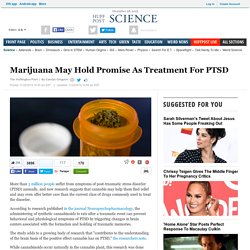
According to research published in the journal Neuropsychopharmacology, the administering of synthetic cannabinoids to rats after a traumatic event can prevent behavioral and physiological symptoms of PTSD by triggering changes in brain centers associated with the formation and holding of traumatic memories. The study adds to a growing body of research that "contributes to the understanding of the brain basis of the positive effect cannabis has on PTSD," the researchers note.
Musicians Have Major Advantage When It Comes To Long-Term Memory. Looking to boost your brain power?
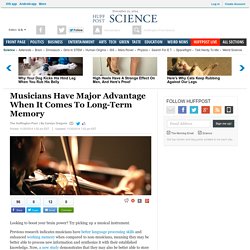
Try picking up a musical instrument. Previous research indicates musicians have better language processing skills and enhanced working memory when compared to non-musicians, meaning they may be better able to process new information and synthesize it with their established knowledge. Now, a new study demonstrates that they may also be better able to store that established knowledge for the long-term, thanks to enhanced long-term memory. University of Texas at Arlington researchers measured electrical activity of neurons in the brains of 14 musicians who had been studying classical music for at least 15 years. The researchers had participants play memory games with both words and pictures while hooked up to electroencephalography technology (EEG), which records processing differences in the frontal and temporal lobes.
Equation 'can predict momentary happiness' 4 August 2014Last updated at 16:26 ET By Melissa Hogenboom Science reporter, BBC News.
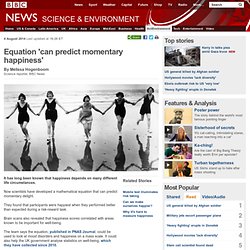
The truth about smart drugs. “You know how they say that we can only access 20% of our brain?”
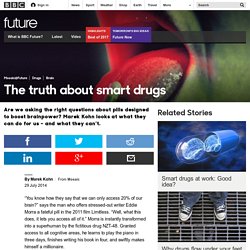
Says the man who offers stressed-out writer Eddie Morra a fateful pill in the 2011 film Limitless. “Well, what this does, it lets you access all of it.” Morra is instantly transformed into a superhuman by the fictitious drug NZT-48. Granted access to all cognitive areas, he learns to play the piano in three days, finishes writing his book in four, and swiftly makes himself a millionaire. Treatment options for chronic refractory idiopathic thrombocytopeni...
Mid-life stress 'precedes dementia' 30 September 2013Last updated at 20:02 ET The study only looked at women, not men Mid-life stress may increase a woman's risk of developing dementia, according to researchers.
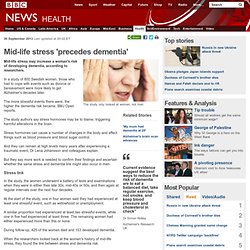
In a study of 800 Swedish women, those who had to cope with events such as divorce or bereavement were more likely to get Alzheimer's decades later. The more stressful events there were, the higher the dementia risk became, BMJ Open reports. The study authors say stress hormones may be to blame, triggering harmful alterations in the brain. Stress hormones can cause a number of changes in the body and affect things such as blood pressure and blood sugar control. Continue reading the main story “Start Quote Current evidence suggest the best ways to reduce the risk of dementia are to eat a balanced diet, take regular exercise, not smoke, and keep blood pressure and cholesterol in check”
Memories lost and found. For nearly a decade, neuroscientist Li-Huei Tsai and her colleagues have been studying senile mice.
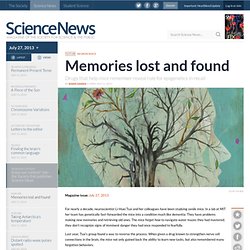
In a lab at MIT her team has genetically fast-forwarded the mice into a condition much like dementia: They have problems making new memories and retrieving old ones. The mice forget how to navigate water mazes they had mastered; they don’t recognize signs of imminent danger they had once responded to fearfully. Olaf Hajek MEMORY MACHINERY | Within the nucleus of a brain cell, the enzyme histone deacetylase (HDAC) helps keep DNA wrapped neatly around histones for orderly storage in the form of chromatin.
For a memory to form and be stored, the DNA must be unwrapped, allowing genes to be read and transcribed into mRNA molecules for making proteins involved in memory. Source: J. Sleep 'boosts brain cell numbers' 3 September 2013Last updated at 21:17 ET.
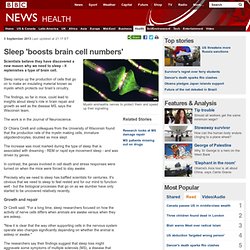
Brain Myths Believed By Most In U.S., Poll Shows. By Rachael Rettner, Senior Writer Published: 09/25/2013 09:31 AM EDT on LiveScience Nearly two-thirds of Americans mistakenly believe that humans use only 10 percent of their brains, according to a new poll on brain health.
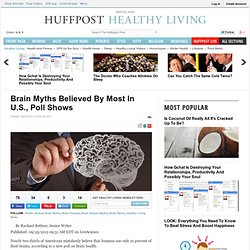
The poll, which surveyed more than 2,000 Americans, found that 65 percent of respondents agreed with the statement "People only use 10 percent of their brains on a daily basis. " In reality, that statement is a myth. Brain imaging technology shows that people use their entire brains. Although not all parts of the brain are active at the same time (just like people don't use all their muscles at once), throughout the day, all the parts of the brain will be used. Americans also have other misperceptions about the brain and brain diseases, according to the new poll, which was conducted by Harris Interactive on behalf of The Michael J.
And 71 percent of those surveyed agreed with the statement "Men and women are at equal risk of developing brain disease. " Face blindness: Seeing but not seeing. 6 October 2013Last updated at 08:25 GMT By Gabriela Torres BBC Mundo health reporter People with prosopagnosia see a face - but don't recognise it Imagine that suddenly you cannot recognise your mother, your partner, your child.
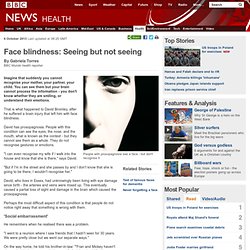
Short-Circuiting Depression. Coa 'might prevent memory decline' Drinking cocoa every day may help older people keep their brains healthy, research suggests.
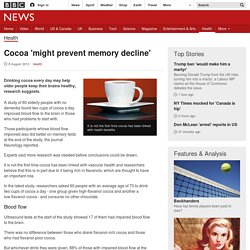
A study of 60 elderly people with no dementia found two cups of cocoa a day improved blood flow to the brain in those who had problems to start with. Those participants whose blood flow improved also did better on memory tests at the end of the study, the journal Neurology reported. How a Memory Game Can Multiply Your Brain’s Computing Power - The Crux. By Ben Thomas When’s the last time you forgot your cell phone? What about your anniversary? We’ve all wished for a better memory at some point. And in those moments, what we’re generally referring to are our fact-based memory systems—the ones that store experiences and learned knowledge, the ones that can be strengthened by flash cards and mnemonic devices.
Viewpoint: The invisible plague of concussion. 5 September 2013Last updated at 23:01 ET By Dr Anand Veeravagu Senior Neurosurgery Resident, Stanford University Traumatic brain injury is a hidden epidemic in the US, reaching beyond American football to wounded military veterans and girls' soccer players. Neurosurgeon Dr Anand Veeravagu outlines concussion's potentially devastating side effects. It is all too common for patients to tell me that they have been knocked out while playing sports or in an accident. Portraits of Narcolepsy in New York City - Aleks Mencel. Harper recently added weekday happy hours to the group’s agenda, encouraging members to unwind after work and share their experiences living with narcolepsy over a beer or two. Spending time with several New York narcoleptics offers a lesson in the unique ways they cope with this condition.
“I’ve never met anyone else with narcolepsy,” Grant Billingsley announced at 12th Street Ale House in the East Village during NYZ Narcoleptics’ first organized happy hour in late November 2013. Diagnosed with narcolepsy at age 17, Billingsley, now 33, has understood the disorder almost exclusively through his own experiences.